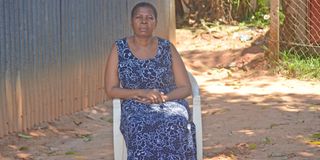Cancer treatment is costly, that’s why I advocate for preparedness

Florence Kitsao at her home in Kiwandani, Kilifi County. The cancer champion has started an awareness campaign 'Mulika saratani' to inform people about the disease.
What you need to know:
- Kitsao's mother’s cancer illness and the financial burden it had on her family made her realise that many families were experiencing tough situations.
- In 2012, they needed Sh2 million for her treatment and efforts to reach out to well-wishers bore no fruit.
- This experience made her realise that many families were experiencing tough situations, yet they did not have a social support system.
- Today, Ms Kitsao carries out her campaign through the Mulika Saratani Cancer Awareness Programme, an organisation.
- She also volunteers by giving health talks at the Kilifi County Hospital as well as some other private health facilities in the county.
Apart from robbing families of their loved ones, cancer has impoverished many households due to the heavy cost of treatment.
Florence Kitsao’s family has endured it all while seeking funds to cater for her mother, Juliana Mwenda, who was suffering from cancer of the oesophagus.
In 2012, they needed Sh2 million for her treatment and efforts to reach out to well-wishers bore no fruit. It is during this time that she contemplated selling her kidney to raise money and repay part of the accrued debt they had incurred during treatment.
The situation had become so desperate for Ms Kitsao that she even attempted to commit suicide twice, owing to threats by financial institutions to take legal action against her for failing to repay money owed to them by her family.
Financial burden
In an interview at her single room in Kiwandani area, Kilifi County, Ms Kitsao says her mother’s illness and the financial burden it had on her family made her realise that many families were experiencing tough situations, yet they did not have a social support system.
Ms Kitsao says after her mother lost the battle, and with a heavy financial burden weighing her down, she decided to “wake up, dust myself and soldier on.”
She approached the Kilifi County Department of Health for support to carry out sensitisation campaigns for families with cancer patients.
“My experience seeking treatment and finances to cater for my mother’s needs taught me tough lessons and while I went through all this, I did not get any psychosocial support. I realised there was a gap that needed to be filled. I did my research and with the help of the Health department, I kicked off the sensitisation programme,” she says.

Ms Florence Kitsao giving a talk at the Kilifi County Referral Hospital on September 28, 2020.
Her first task was to bridge the gap between the community and health facilities in a bid to address late diagnosis.
“Many residents are unaware that cancer screening is done at local health facilities. Early diagnosis, research has shown, is key to fast treatment which results to lesser financial burden on families. Secondly, the community needed to be enlightened on the many types of cancers and the symptoms to look out for,” she adds.
Today, Ms Kitsao carries out her campaign through the Mulika Saratani Cancer Awareness Programme, an organisation that was founded and registered in 2018.
Before that, she was carrying out her cancer advocacy with a team of Pwani University students through the Elite of Hope Change organisation.
She also volunteers by giving health talks at the Kilifi County Hospital as well as some other private health facilities in the county.
Cancer walk
What is outstanding about Ms Kitsao is that she has no funding and all the work she does is supported by well-wishers.
In September 2017, and October 2018, she organised a cross-county cancer walk from Kwale to Tana River and Kilifi to raise awareness about the disease.
Ms Kitsao says she has encountered challenges in her work and her sheer determination has kept her going.
“I used to work with a group of volunteers and one day, they abandoned the project for lack of money,” she says.
Her ambition, she says, is to get funders to support the programme as well as have a kitty to help families of cancer patients meet their medical bills.
“I keep encouraging people to register for the National Health Insurance Fund (NHIF) to be able to access treatment,” she says.
“The main challenge is that many cancer patients cannot afford to go for chemotherapy and radiography treatment due to poverty. This has resulted to a rise in fatalities yet with timely treatment, the cancer can go on remission extending the life of the patient,” says Ms Kitsao.





